- Home
- Simon Beckett
The Chemistry of Death dh-1 Page 17
The Chemistry of Death dh-1 Read online
Page 17
'Oh, Christ!'
I don't know who spoke. Everyone there was seasoned in this work, but I don't think any of us could have seen anything like this before. The mutilation had been reserved for the victim's front. The abdomen had been cut open, and several objects spilled from the gaping wound as the body was turned. One of the officers quickly turned away, gagging. For a moment no-one moved. Then professionalism took over again.
'What the hell are they?' Mackenzie asked in a hushed, shocked voice. His normally sun-reddened face had turned white. I looked at them, but still couldn't say. This was outside my experience.
It was one of the crime scene officers who was the first to realize. 'They're rabbits,' he said. 'Baby rabbits.'
Mackenzie came over to where I was sitting in the open back of the Land Rover, a bottle of chilled water in my hand. I'd done as much as I could for now. It had been a relief to finally take off my coveralls. But even though I'd washed myself at the police trailer I still felt unclean, and not just because of the heat.
He sat next to me without saying anything. I took another drink of water as he unwrapped a packet of mints.
'Well,' he said at last. 'At least we know it's the same man.'
'Silver lining to every cloud, eh?' It came out sounding harsher than I'd meant. He glanced at me.
'You OK?'
'Just out of practice at this sort of thing.'
I thought he might apologize for involving me. He didn't. The silence ran for a while before he spoke again. 'Lyn Metcalf's been missing for nine days. If she's been dead for six or seven, like you say, that means he kept her alive for at least two. The same as Sally Palmer.'
'I know.'
He stared off into the distance, where the mercury surface of the lake shimmered in the heat. 'Why?'
'I'm not with you.'
'Why keep them alive for so long? Why take the risk?'
'I'm sure this isn't news to you, but we're not exactly dealing with a rational mind.'
'No, but he's not stupid. So why's he doing it?' He chewed his lip, looking annoyed. 'I can't see what's going on here.'
'In what way?'
'Usually when women are abducted and killed the motive's sexual. But this doesn't fit the usual pattern.'
'So you don't think they were raped?' The condition of this second body meant it would be just as impossible to say for certain as it had been with Sally Palmer. But it would have been some small comfort if the victims had been spared that much at least.
'That's not what I said. You find a woman's body without any clothes, it's a fair bet there was some kind of sexual assault, at least. But your run-of-the-mill sexual predator generally kills his victims straight away, as soon as he's got his rocks off. Very occasionally you'll get one who keeps them alive until he's tired of playing with them. But what this one's doing here, it doesn't make sense.'
'Perhaps he needs to build up to it.'
Mackenzie looked at me for a moment without speaking. He shrugged. 'Perhaps. But on the one hand we've got someone who's intelligent enough to snatch two women and disrupt the search by planting snares, and on the other doesn't bother to get rid of the bodies properly. And what about the mutilations? What's the point of those?'
'That's one to ask the psychologists, not me.'
'I will, don't worry. But I don't think they're likely to know either. Is he deliberately showing off or just being careless? It's like we're dealing with two conflicting mindsets.'
'A schizophrenic, you mean?'
He was frowning, worrying at the puzzle. 'I don't think so. Someone obviously mentally ill would have shown up long before now. And I'm not sure they'd be capable of this.'
'There's another thing,' I said. 'He's killed two women in, what, less than three weeks? And the second was only ten, eleven days after the first. That's not…' I was about to say 'normal', but that wasn't a word that could be remotely applied to this. 'That's not usual, is it? Even for a serial killer.' Mackenzie looked tired. 'No. No, it's not.'
'So how come he's suddenly in such a rush? What's triggered him?'
'If I knew that we'd be halfway to catching the bastard.' He stood up, wincing as he kneaded the small of his back. 'I'll have the body brought to the lab. Probably tomorrow, OK?'
I nodded. But as he moved away I called him back. 'What about the dead birds and animals? Are you going to go public about them now?'
'We can't release details like that.'
'Not even if he's using them to mark out his victims in advance?'
'We don't know he is for certain.'
'You told me there was a stoat left on Sally Palmer's doorstep, and Lyn Metcalf told her husband she'd found a dead hare the day before she disappeared.'
'Like you said yourself, this is the countryside. Animals die all the time.'
'They don't tie themselves to stones or climb into a murdered woman's stomach.'
'We still don't know he used them to target his victims beforehand.'
'But if there's even a chance don't you think you should warn people?'
'What, and invite all the cranks and practical jokers to waste everyone's time? We'd be swamped with calls every time a bloody hedgehog gets run over.'
'If you don't he could target another victim without them knowing it. If he hasn't already.'
'I know that, but people are scared enough as it is. I'm not going to start a panic.'
But there was an undercurrent of doubt to his voice. 'He's going to do this again, isn't he?' I said.
For a second I thought he would actually answer. Then, without a word, he turned and walked away.
17
News that Lyn Metcalf's body had been found detonated in Manham like a silent bomb burst. Given what had happened to Sally Palmer, few people could have been surprised exactly, but that didn't lessen the shock. And while Sally, for all her popularity, had been an outsider, an immigrant to the village, Lyn had been born here. Gone to school here, married in the church. She was a part of Manham in a way that Sally could never be. Her death – her murder – had a far more visceral impact on people who could no longer pretend that the victim might somehow have imported the seeds of their fate from outside. Now the village mourned for one of its own.
And feared another.
There could no longer be doubt in anyone's mind that something terrible was happening in Manham. For this to happen to one woman was bad enough. For it to happen to two, in so short a space of time, was unprecedented. Suddenly, we were news again. The village once again found itself caught in the spotlight, a collective traffic accident for the public to gawp at. As all victims do, it reacted first with bewildered disbelief, then resentment.
Then anger.
Lacking any other focus on which to vent it, Manham reacted by rounding on the outsiders attracted by its misfortune. Not the police, although resentment for their impotence was already starting to bubble. But the press had no such immunity. The news-gathering media's breathy excitement seemed to many to evince not just a lack of respect, but also contempt. It was met with hostility, exhibited first by stony faces and closed mouths, but then by more overt means. Over the next few days untended equipment either went missing or sustained mysterious damage. Cables were cut, tyres slashed, petrol tanks spiked with sugar. One persistent reporter, whose tightly lipsticked mouth seemed curled in a permanent and inappropriate smile, needed stitches when a flung stone gashed open her head.
Nobody saw anything.
But all that was only a symptom, an outward expression of the real malaise. After centuries of self-containment, of knowing it could always rely on its own no matter what, Manham could no longer trust itself. If suspicion had been a contagion before, now it threatened to become an epidemic. Old feuds and rivalries developed a more sinister depth. A fight broke out one night between three generations of two different families when smoke from a barbecue drifted over the wrong garden. A woman phoned the police in hysterics, only to find that her 'stalker' was a neighbour walki
ng his dog. And two houses had bricks thrown through their windows; one for a perceived slight, the other for no reason anyone was ever able to determine, or at least admit.
And through it all, one man's presence seemed to grow larger every day. Scarsdale had become the voice of Manham. Where everyone else shunned the media, he showed no such reticence in putting himself before the cameras and microphones. He played all sides off against each other, speaking out against the police failure to catch the killer, the moral complacency that he claimed had led to this situation, and – apparently unaware of the irony – the press for exploiting the tragedy. If it had been anyone else they would have been accused of courting publicity. But, while there were a few mutterings about his willingness to have his sulphurous views broadcast, our good reverend developed a growing support. His voice thundered with the outrage everyone felt, and what it lacked in reason it more than made up for in intensity and volume.
Even so, perhaps naively, I expected him to keep his most vociferous announcements for the pulpit. But I'd underestimated Scarsdale's capacity to surprise, as well as his determination to capitalize on his new-found importance. So I was as unprepared as anyone when he announced he was holding a public meeting in the village hall.
It was held on the Monday after Lyn Metcalf's body had been found. The day before there had been a memorial service for her in the church. I'd been surprised to find that this time Scarsdale had refused to allow the media inside. Cynically, I'd wondered if that was less from consideration for the bereaved family than to make the press feel they were missing out. As I approached the village hall, I saw I'd been right.
The hall was a low, utilitarian building set back from the village square. When I'd driven past that morning on my way to the lab I'd seen Scarsdale outside, imperiously directing Tom Mason in its garden. Now the scent of freshly cut grass sweetened the air, and the yew hedges had been neatly trimmed. Old George and his grandson had been kept busy. Even the already immaculate green in the village square had been mown again, so that the area under the sweeping old horse chestnut and around the Martyr's Stone looked almost park-like in its neatness.
But I doubted it had been for our benefit. Denied access to the memorial service, the press had seized on the public meeting as the next best thing. Except this was less a public meeting than a press conference, I realized as I went into the hall. Rupert Sutton stood at the entrance, sweating and breathing adenoidally as he guarded the door. He gave me a reluctant nod, clearly aware I'd earned Scarsdale's disapproval.
Inside it was already cramped and hot. At the far end was a small stage, on which stood a trestle table and two chairs. A microphone was set in front of one of them. On the floor in front of the stage rows of collapsible wooden seats had been set out, leaving space around the sides and at the back of the hall for the TV crews and journalists.
All the seats were taken by the time I arrived, but I saw Ben standing off in one corner where there was a little more space. I made my way over.
'I didn't think I'd see you here,' I said as we regarded the packed hall.
'Thought I'd hear what the miserable bastard has to say. See what poisonous bullshit he's dreamed up now.'
He stood a good head above most of the other people there. I noticed a few of the TV crews looking over at him, but none seemed inclined to try their luck with an interview. Or perhaps they just didn't want to risk losing their places.
'Doesn't look like any of the police are here,' Ben said. 'You'd have thought they'd show their faces at least.'
'They haven't been invited,' I told him. Mackenzie had admitted as much earlier. He hadn't been happy about it, but a decision had been taken above his head not to interfere. 'Manham residents only.'
'Funny, I don't recognize some of the neighbours,' he said, looking at the assembly of cameras and microphones. He sighed and pulled at the neck of his shirt. 'God, it's hot in here. Fancy a pint afterwards?'
'Thanks, but I can't.'
'Got some late visits?'
'Uh, no, I'm seeing Jenny. You met her in the pub.'
'I know, the teacher.' He grinned. 'Been seeing quite a bit of each other, haven't you?'
I was conscious that my face had coloured like a teenager's. 'We're just friends.'
'Right.'
I was glad when he changed the subject. He looked at his watch. 'Might have guessed he'd keep everybody waiting. What do you think he's up to?'
'Soon find out,' I said, as a door on the stage opened.
But it wasn't Scarsdale who appeared. It was Marcus Metcalf.
The room instantly quietened. Lyn Metcalf's husband looked awful. He was a big man, but grief seemed to have reduced him. His suit was crumpled and he walked in slowly, as though favouring some deep injury. When I'd visited him shortly after the police had broken the news he seemed to have been barely aware of me. He hadn't wanted a sedative, for which I couldn't blame him. Some wounds can't be dulled, and trying only makes them worse. But looking at him now I wondered if he hadn't taken something anyway. He looked dazed and in shock, a man caught in a waking nightmare.
In the silence, Scarsdale followed Marcus out onto the stage. Their footsteps echoed on the wooden boards. As they approached the table the reverend placed his hand supportively – proprietorially, I couldn't help but think – on the younger man's shoulder. I felt a prickle of apprehension, knowing that the presence of the latest victim's husband would give far more credibility to whatever our reverend had in mind.
Scarsdale steered him towards one of the chairs. The one without a microphone, I noticed. He waited until Marcus was seated before sitting down himself. He tapped the microphone once, making sure it was working, then unhurriedly surveyed the people in front of him.
'Thank you all for-' A faint whine of feedback made him draw back, frowning sharply in displeasure. He slid the microphone further away before continuing. 'Thank you for coming. This is a time of mourning, and under normal circumstances I would respect that. Unfortunately, the circumstances are far from normal.'
His amplified voice sounded even more sonorous than usual. While he spoke Lyn Metcalf's husband stared down at the table as though he wasn't aware of anyone else in the room.
'I will be brief, but what I have to say concerns all of us. It concerns everyone in this village. I would ask only for you to hear me out before asking any questions.' Scarsdale didn't look at any of the press when he spoke, but it was obvious who that last point was addressed to.
'Two women we all knew have now been killed,' he went on. 'As unpalatable as it may be, we can no longer avoid the fact that, in all likelihood, someone from this village is responsible. The police are obviously either unable, or perhaps unwilling, to take the necessary steps. But we can no longer sit back while women are being kidnapped and murdered.'
With deliberate, almost exaggerated solicitude, Scarsdale gestured to the man beside him. 'You all know the loss Marcus has suffered. The loss that his wife's family have suffered, having their daughter, their sister, ripped from them. Next time it could be your wife. Or your daughter. Or your sister. How much longer are we going to do nothing while these atrocities continue? How many more women must die? One? Two? More?'
He glared around, as if waiting for an answer. When none came, Scarsdale turned and murmured something to Lyn Metcalf's husband. The man blinked as if waking up. He looked blankly into the crowded hall.
'You have something to say, don't you, Marcus?' the reverend prompted, moving the microphone in front of him.
Marcus seemed to come to himself. He looked haunted. 'He killed Lyn. He killed my wife. He…' His voice faltered. Tears had started running down his face. 'He's got to be stopped. We should find him, and… and…'
Scarsdale put a hand on his arm, either to comfort or restrain. The reverend's expression was one of pious satisfaction as he slid the microphone in front of himself again.
'Enough is enough,' he said, in reasoned, measured tones. 'Enough… is… enough!' He slowly be
at the table in emphasis. 'The time for doing nothing has passed. God is testing us. It's been our weakness, our complacency, that has allowed this creature masquerading as a man to conceal himself among us. To strike with impunity and contempt. And why? Because he knows he can. Because he sees us as weak. And he doesn't fear weakness.'
The microphone jumped as he banged his fist on the table.
'Well, now it's time to make him fear us. Now's the time to show our strength! Manham has been a victim for too long! If the police cannot protect us, then we should protect ourselves! It's our duty to root him out!'
His raised voice merged into a howl of feedback. As he sat back the hall burst into commotion. Many of the people in the chairs came to their feet, applauding and shouting approval. As the cameras flashed and journalists shouted questions, Scarsdale sat centre stage and surveyed his work. For a moment he looked right at me. His eyes burned with fervour. And triumph, I realized.
Unnoticed, I made my way out.
'I just can't believe the man,' I said angrily. 'He seems to want to stir people up rather than calm things down. What's wrong with him?'
Jenny threw a piece of bread for a duck that had waddled up to our table. We were at a pub on the banks of the Bure, one of the six rivers that run through the Broads. Neither of us had wanted to stay in Manham, and although this was only a few miles away it could have been a different world. Boats were moored on the river, children played nearby, and the tables were full of people chatting and laughing. Textbook English pub, textbook English summer. It was a far cry from the oppressive atmosphere we'd left behind.
Jenny gave the last crumbs to the duck. 'He's got people listening to him now. Perhaps that's what he wants.'
'But doesn't he realize what he's doing? One man's already been put in hospital by idiots who got carried away, and now he's encouraging vigilantes. And using Marcus Metcalf to drum up support!'
I remembered how Scarsdale had been with him even during the search for his wife. I wouldn't have put it past our reverend to have been priming him even then, getting ready to exploit the tragic husband. I wished now I'd spoken to Marcus when Lyn went missing. I hadn't wanted to intrude on his grief, but I couldn't deny there might be a selfish aspect as well. Seeing him had been a painful reminder of my own loss, but by standing back I'd given Scarsdale a free rein to exert his influence. And he hadn't missed the opportunity.

 Where There's Smoke
Where There's Smoke The Chemistry of Death
The Chemistry of Death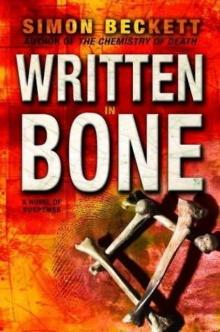 Written in Bone
Written in Bone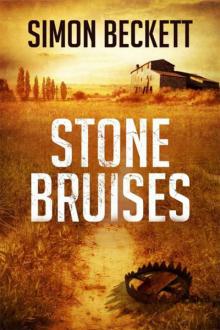 Stone Bruises
Stone Bruises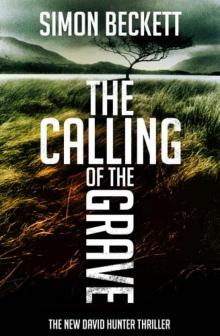 The Calling of the Grave
The Calling of the Grave Whispers of the Dead
Whispers of the Dead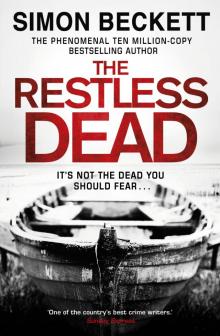 The Restless Dead
The Restless Dead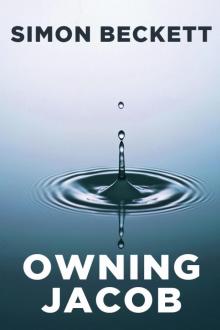 Owning Jacob
Owning Jacob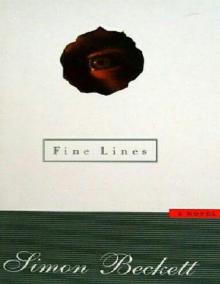 Fine Lines
Fine Lines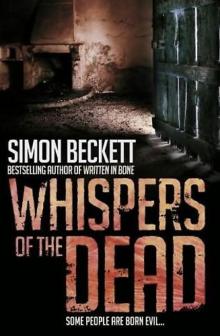 Whispers of the Dead dh-3
Whispers of the Dead dh-3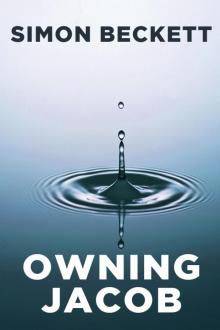 Owning Jacob (1998)
Owning Jacob (1998)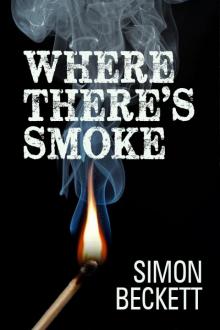 Where There's Smoke (1997)
Where There's Smoke (1997) Written in Bone dh-2
Written in Bone dh-2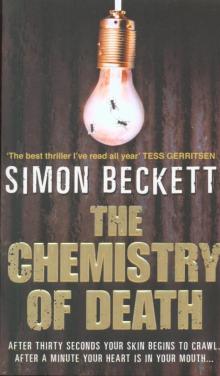 The Chemistry of Death dh-1
The Chemistry of Death dh-1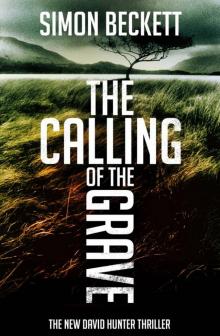 The Calling Of The Grave dh-4
The Calling Of The Grave dh-4